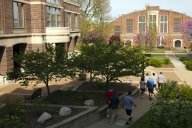You have /5 articles left.
Sign up for a free account or log in.
WASHINGTON -- Community colleges are no longer the “best-kept secret” in higher education. The colleges are getting plenty of attention for their role in workforce training, and at the same time feeling growing pressure to improve low graduation rates -- a trend that continued Monday with the naming of Valencia College as the first winner of the Aspen Prize for Community College Excellence.
Valencia, a large two-year institution in Florida that is widely considered a top community college, edged out the competition in part for its strides on completion rates.
“Valencia reworked many traditional processes that other colleges view as immutable,” according to an Aspen-produced pamphlet describing the 10 finalists for the award. By giving students earlier advising and orientation, as well as offering a “Student Success” course, the college has tried “new things where they’ll matter most, for the neediest students."
The three-year, full-time graduation and transfer rate for minority students at Valencia is 43 percent, which outpaces the national average of 33 percent. And the completion rate for Valencia’s career programs has grown 44 percent over four years.
With the selection of Valencia, the prize committee has reinforced a strong Beltway focus on student outcomes in a sector where access has traditionally come first. In addition to weighing graduation rates, the award process involved intensive data-gathering on colleges’ labor market success, learning outcomes and performance with underserved student populations. Funding the prize was the Lumina Foundation for Education, a major force for the completion agenda, as well as the Joyce Foundation, Bank of America and J.P. Morgan.
“It can’t be just about getting in the door” at community colleges, Arne Duncan, the secretary of education, said at the event. “We have to take community college outcomes to the next level.”
Joshua Wyner, executive director of the Aspen College Excellence Program, told Inside Higher Ed that the group plans to make the award an annual affair. And he confirmed that the $1 million-total prize pot would be replenished each year, at least for the foreseeable future.
One of the goals of the prize is to create better metrics to track community college performance. And all the better if colleges try to change how they do business to win, said Wyner, because unlike other rankings efforts, this process can only lead to changes that will help students.
“We would like them to game this system,” he said.
Valencia received $600,000 for winning. Four colleges were named runners-up “with distinction,” each earning $100,000. They were Lake Area Technical Institute (S.D.), Miami Dade College, Walla Walla Community College (Wash.), and West Kentucky Community and Technical College.
The prize was culled from an initial list of “120” best community colleges. (There are about 1,200 two-year colleges in the U.S.) Those colleges had to submit detailed applications to be considered for the final 10. That group included Mississippi Gulf Coast Community College, Mott Community College (Mich.), Northeast Iowa Community College at Calmar, Santa Barbara City College (Calif.) and Southwest Texas Junior College.
Perhaps even more valuable than the money is that all 10 of the Aspen finalists can now call themselves top community colleges, a validation that doesn’t come often.
While community colleges are clearly getting more love these days, the event also offered a reminder that the colleges and their students have long served as props for politicians looking to show empathy for the working class. The praise, however, rarely translates into funding increases for two-year institutions, which have been battered by flat or reduced state contributions.
Richard Riley, secretary of education during the Clinton administration and co-chair of the prize jury, said Monday that the first graduation ceremony he attended as secretary was at Miami Dade, which was then called Miami Dade Community College. He was hardly the last White House official to pay homage to Miami Dade -- President Obama delivered the commencement address there earlier this year.
So while the attention will likely continue for community colleges, particularly for big names in the sector like Valencia and Miami Dade, the budget situation remains far dicier. And without money, improved graduation rates may be a tall order.








